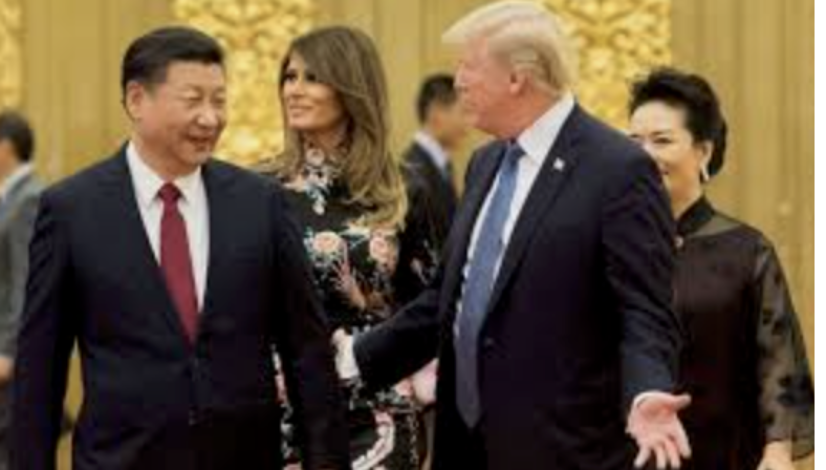Trump winning trade war with China even as White House blinks

Renewed telephone conversations between high-level American and Chinese trade negotiators have led the White House to postpone tariffs on some Chinese imports from Sept. 1 to Dec. 15, and to remove other items from the list altogether. Critics will say that President Trump blinked, buffeted by swooning stock markets and talk of a possible recession that could damage his reelection prospects.
That may be true. But it is also true that much of what the trade battle was meant to achieve has already been accomplished. That’s called winning.
Though elites continue to deplore Trump’s hawkish stance against China’s cheating, the confrontation has helped publicize Beijing’s corrupt and despotic regime. The result is an emboldened pro-democracy uprising in Hong Kong, a reordering of global supply chains formerly overly dependent on China and, perhaps most important, more aggressive truth-telling by the media. Those are significant accomplishments.
Starting with the media turnaround: A recent piece in the Financial Times reported that a group of Chinese hackers were “carrying out political espionage for Beijing while simultaneously attacking businesses for personal financial gain.”
A U.S. cybersecurity group called Fireye has, according to The Financial Times, identified a well-financed hacking cell within China that has been spying on numerous industries and individuals since 2014 at the behest of the government while carrying out for-profit cyber intrusions, apparently tolerated or condoned by the state. Called Advanced Persistent Threat 41, the spy group has operated in 14 countries, including the U.S., and targeted industries important to the success of Beijing’s five-year economic plan like telecom, AI and semiconductors.
The most interesting thing about the Times story, to long-time critics of the West’s interactions with China, is that it was reported at all. There was a time when media companies were intimidated by Beijing and reluctant to expose the government’s role in cyber crimes and intellectual property theft or, indeed, a host of other misdeeds such as the persecution of the Uighurs.
You can hardly blame them.
The New York Times saw its English and Chinese-language websites blocked in China in 2012 when it published an article detailing the wealth of Prime Minister Wen Jiabao. Google and Bloomberg (which dared to publish a story about Xi Jinping’s wealth) also got into hot water with China’s censorship machine. A piece on media censorship published by the Council on Foreign Relations noted that “the France-based watchdog group Reporters Without Borders ranked China 176 out of 180 countries in its 2016 worldwide index of press freedom.”
Media outfits took note and proceeded with caution.
That has changed, and we should credit President Trump for helping to “out” Beijing as a bad actor.
The White House’s pushback against China’s forced technology transfers, widespread espionage and unfair trade practices has not only encouraged more critical press coverage, it has also driven Americans’ disapproval of China to record levels. As our government attempts to protect U.S. interests in China, it helps to bring the public along.
It has also demanded more honesty from America’s multinational corporations, which have protected Beijing for decades, fearful that criticizing Chinese policymakers would exclude them from the fastest-growing large market on earth and a source of enormous cheap labor.
It wasn’t just U.S. firms; the entire world turned a blind eye to Beijing’s bad practices, convinced that China’s sheer size and rapid transformation into an open, industrial society would deliver huge benefits to every nation. That was the premise for inviting China’s participation in the World Trade Organization in 2001; the member nations, which embrace market economies, hoped Beijing would behave. That proved a false hope.
In the wake of tariffs being levied on Chinese imports, American and European firms are reordering their sourcing. It’s high time. Depending on a country that scorns the rule of law is foolhardy. In the past few years, Chinese officials have “disappeared” any number of prominent business leaders in China and harassed and threatened to hold foreign executives hostage for political purposes.
These tactics, in addition to other outrages and combined with rising local wages, have made diversification an obvious necessity. Evidence of companies shifting their business to Vietnam and elsewhere is more than anecdotal. Quality Control & Supply Chain Audits, a company that monitors supply chain compliance, reported recently that demand for their inspections and audits in China from U.S.-based companies dropped by 13 percent in the first half of 2019 compared to the year before.
Citing its own mid-year survey, the company also noted that more than two-thirds of businesses in the U.S. and European Union had already started sourcing from new countries this year, or had plans to do so in the near future.
That signals a vast turnaround.
Meanwhile, the protests in Hong Kong could significantly weaken that region’s position as Asia’s top financial center, further undermining Beijing’s economy. Hong Kong has played a critical role in funneling capital into and out of mainland China and in building the country’s financial markets. About 58 percent of money flowing out of China passes through the semiautonomous region.
If investors come to perceive Hong Kong as unstable, China’s ability to attract foreign investment, cited as a key pillar of Beijing’s five-year plan, will also come under threat. Already, wealthy Chinese who once viewed Hong Kong as a safe haven have been shifting assets elsewhere.
The U.S. and other developed countries will not benefit from China’s problems unless slowing growth and capital flight press Beijing to amend its behavior. Whether Xi Jinping will choose to compromise with the Trump White House and with the pro-democracy protestors in Hong Kong remains to be seen. But here’s what we do know: Beijing is under pressure as never before, thanks to President Trump’s trade battle. And the entire world could benefit.
Published on The Hill




